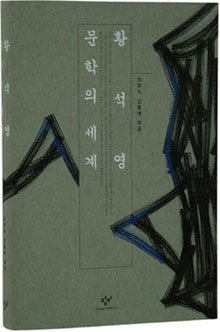The Life and Literature of Hwang Suk-young Reviewed by Fourteen People From Korea and Abroad.
The Life and Literature of Hwang Suk-young Reviewed by Fourteen People From Korea and Abroad.
Posted November. 14, 2003 23:03,

The World of Hwang Suk-youngs Literature
With novelist Hwang Suk-youngs sixtieth birthday (celebrated as Hoi-gap in Korean culture) coming up on December 14, a new collection of essays reviewing his 40 years of work called The World of Hwang Suk-youngs Literature is being published. Fourteen authors from Korea, Japan, China, Germany and other countries have participated, and the collection includes twelve literary criticism essays, along with three personal essays about the novelist. Among them, a dialogue between the novelist and the professor and literary critic Choi Won-shik of Inha University merits special attention, since it touches on the novelists life and ideologies as well as the vivid stories in his literature.
The novelist was born in Jangchun, Manchuria in 1943. His mothers family was from Pyongyang, and his mothers father was a man of wealth who founded the Pyongyang Professional Medical School, the former Department of Medicine at Kim Il-sung University. His mother had a rich literary sensibility and read a broad range of literature, from Japanese to Western classics. She would buy books like A Little Princess and Gullivers Travels on her way back home from the market, even when they were under shelter in Daegu during the Korean War.
After graduating from elementary school, he went on to Gyeongbok Middle School, where his grades began to drop precipitously. The novelist confesses, That was why I developed fun stories and my writing skills, to make up for my grades. During high school, he won many literary competitions and was interested only in writing. He suddenly left school and his home in 1962 to wander around the Namdo area in the southern part of Korea, returning home in October the same year. Then, he won the New Writer Award of Sasanggye in November with a short story called Near the Standing Stone.
He participated in the Vietnam War in the second camp of the Chengnyong Unit after joining the Marine Corps in 1966. In 1969, he won a prize at the Chosun Ilbo New Spring Literary Contest. The award-winning work Pagoda was first sent to Creation and Criticism (Changjak-gwa-Bipyong), but was rejected by the poet Yoem Moo-woong, who said, Why did Korean troops kill so many Vietcong in such ways?
Strange Land (1971) is a novel that he wrote following the shock of the suicide of Jeon Tae-il, who burned himself to death in the Pyoenghwa market. The original ending of the novel had the hero Donghyuk holding dynamite in his mouth and dying a brave death by the explosion, but that had to change. I knew Moo-woong was worried about its radical themes, so I told him to cut the ending since it was too intense. Then I cut the last few lines myself.
He participated at the First Pan-Nation Convention held in Pyongyang in August 1990. When he returned to Korea in 1993, he was sentenced to seven years in prison under the National Security Law. He lived a severe life in the prison for the first three years, losing fourteen of his teeth. He has been on nineteen hunger strikes and fought with the prison guards by kicking the door every day.
He spent four years in that manner, but one day he realized that he had to start writing again if he ever wanted to return to the literary world and not to become useless. From then on, he made friends with petty criminals and made a fruit knife by sharpening a piece of can on a cement wall.
I thought the details in daily life were important, so I tried hard, and my health improved also. I think that was the source of the power which enabled me to work as diligently as an ant after my release in 1998.
His two-volume, full-length novel Shimchung, the Way of Lotus Flower, will be published by Munhakdongne later this month, with the books publication ceremony to be held along with the birthday celebration at Korea Press Center in Chung-gu, Seoul on December 1. The novelist will be studying at Cambridge University as a visiting scholar for two years starting next March.
Yi-Young Cho lycho@donga.com



![“한동훈, 정치생명 걸고 무소속 출마해 평가받는 것 고려할만”[정치를 부탁해]](https://dimg.donga.com/c/138/175/90/1/wps/NEWS/IMAGE/2026/01/19/133186982.1.jpg)
![‘건강 지킴이’ 당근, 효능 높이는 섭취법[정세연의 음식처방]](https://dimg.donga.com/c/138/175/90/1/wps/NEWS/IMAGE/2026/01/18/133181291.1.jpg)


